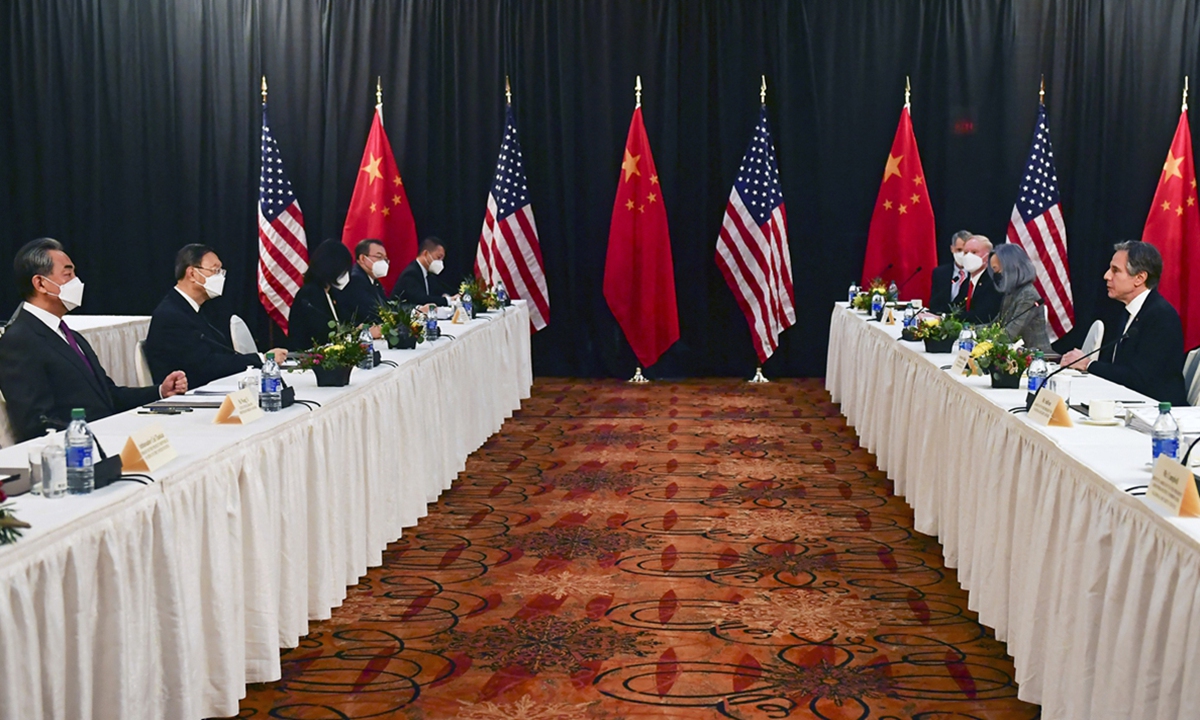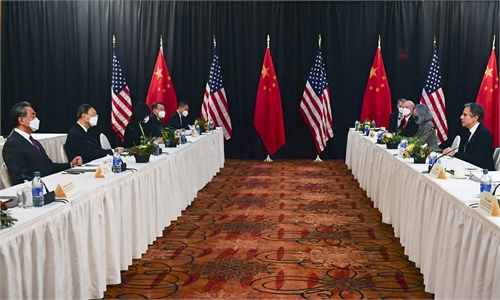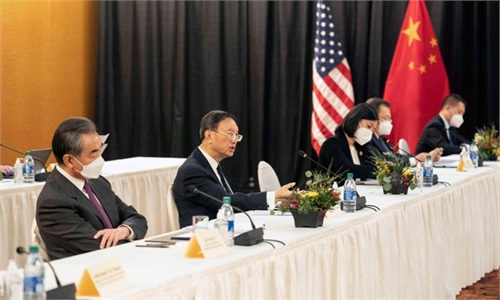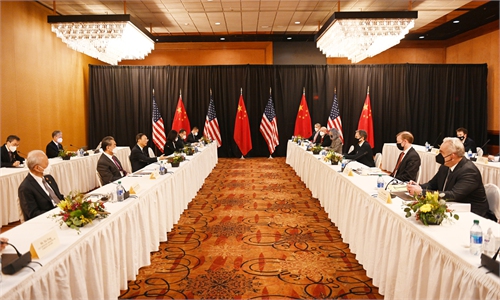Rebuttal at Alaska talks shows China rejects West’s hierarchy of civilizations

Photo: AFP
Following the China-US Alaska meeting held on March 18, a popular phrase erupted across Chinese social media platforms, "This is not the way to deal with Chinese people." Now, many kinds of products are being printed with this phrase.The phrase, "this is not the way to deal with Chinese people," reflects Chinese people's psychological disapproval of how the West structures the hierarchy of civilizations. Some netizens posted photos of Li Hongzhang and other senior officials from the Qing Dynasty (1644-1911) signing the Xinchou Treaty (Boxer Protocol) with Western powers in 1901, including the US. This was a comparison to photos of Chinese and US officials sitting face-to-face during their talks in Alaska. The treaty signed in 1901 has long been regarded as a symbol of national humiliation.
The Alaska meeting showed the Chinese people that China-US relations have changed dramatically since more than a century ago. However, the national psychology that influences the relations seems to have changed a little. This will continue to be an important factor influencing China-US relations in the future.
The recently published book China and the United States: Great Power Diplomacy and the Rise and Fall of the Late Qing Dynasty, 1784-1911 utilizes a large number of historical materials to provide good insight into the American concept of civilizational hierarchy and its initial relations with China.
The author is Wang Yuanchong, a historian. Wang now works as an associate professor for the Department of History at the University of Delaware. He believes that US' original trade with China was part of the expansion of "Westward Movement" based in New England. It was established on the logic of civilizational hierarchy, with strong religious colors. This was not only a geographical "Westward Movement" but also a "Manifest Destiny" moment to promote the expansion of its civilization and institutional models to other places. In that age, there was a mind-set to redeem other civilizations with their own culture in an attempt to civilize the so-called "barbarians."
Around the same time, in 1885, US Protestant clergyman and author Josiah Strong wrote in his book Our Country, quoting Charles Darwin, as saying, "the more energetic, restless, and courageous men from all parts of Europe have emigrated during the last ten or twelve generations to that great country [note: the US]." The author, thus, believed that the Anglo-Saxon, especially those in the US, "sustains peculiar relations to the world's future" and it is "divinely commissioned to be… his brother's [note: other races'] keeper."
Over a century has passed since then. The US has not conquered the world, and the ideas pursued by the Americans have not yet been accepted by the world, but the country has become the only world superpower.
In recent years, historians have unearthed greater research materials that more finely detail US ambitions to expand their civilization concealed under the layer of "warmth" that the US showed at the beginning of its relations with China. In fact, the US desire to expand its civilization was just as strong as other powers at that time.
Wang believes that the concept of "Manifest Destiny" has had a huge impact on the US since the 19th century. It still influences US' religious life and foreign policy today.
Of course, we can also understand that, compared with the US, China has undergone great changes. This includes the way Chinese people view the West, and the rest of the world.
Religion is exclusive. The American concept of religious conquest is essentially a division of the world into different classes. It also sees the development of world civilization as a single linear process. In the eyes of the US, other countries are developing by following the steps of the US, and they are not allowed to take a shortcut to overtake the US. Therefore, they are never on par with the US.
In fact, we can also feel the existence of such civilizational hierarchy in the current hate crimes against Asian communities in the US. Even though more than 100 years have passed since the first waves of Chinese exclusion in the 19th century, whenever a sensitive event that affects China-US relations occurs, it quickly arouses Americans' deep-seated disapproval of non-white races.
Therefore, what we saw at the Alaska talks was: Chinese delegates responded strongly to accusations the US has made against China in a condescending manner, and emphasized that this is not the way to deal with the Chinese people.
Wang Jisi, dean of the School of International Studies at Peking University, in an article commemorating the late US scholar Ezra Vogel, said that Vogel reminded Americans to pay attention to the fact that China's system and policies are nurtured by China's special historical and cultural traditions. And that they are different from those in the West. These must be understood when dealing with China.
Regrettably, Vogel's rare suggestion hasn't gotten due attention.
It seems some people still can't evolve out of their original psychological circle - after China and the US have interacted for over 200 years.
The author is a senior editor with People's Daily, and currently a senior fellow with the Chongyang Institute for Financial Studies at Renmin University of China. dinggang@globaltimes.com.cn. Follow him on Twitter @dinggangchina




